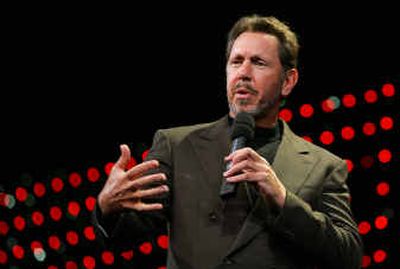Oracle finally takes over rival PeopleSoft

SAN FRANCISCO – Oracle Corp. finally scooped up bitter rival PeopleSoft Inc. after 18 months of legal and verbal strife, ending a nasty feud with a $10.3 billion deal that promises to shake up the business software industry.
Oracle sealed the agreement, which was announced Monday, by upping its all-cash offer by 10 percent to $26.50 per share.
The final offer represents a 75 percent premium from PeopleSoft’s market value before Oracle launched the takeover battle in June 2003.
“A lot of people compared us to Don Quixote titling at windmills, but finally we now have PeopleSoft,” Oracle CEO Larry Ellison said during an interview Monday. “Clearly, it’s a great feeling. It’s not that I wanted to win just for the sake of winning. It’s the fact that PeopleSoft is instrumental to our strategy.”
The resolution pleased investors.
PeopleSoft’s shares surged $2.47, or 10.3 percent, Monday to close at $26.42 on the Nasdaq Stock Market, where Oracle’s shares climbed $1.35, or 10.1 percent, to close at $14.63. Until Monday’s gain, Oracle’s stock had been worth roughly the same as when the PeopleSoft saga started.
Bolstered by the addition of PeopleSoft’s 12,750 customers and nearly $3 billion in annual revenue, Oracle is betting it can mount a more serious challenge to German software maker SAP’s leadership in business applications software – the computer coding that automates a wide range of administrative tasks.
Oracle is already the world’s largest supplier of databases — a position it hopes to strengthen by getting PeopleSoft’s customers to spurn rival products from Microsoft Inc., IBM Corp. and Sybase Inc. in favor of Oracle’s wares.
After completing the takeover next month, Oracle expects the PeopleSoft acquisition to boost its earnings by about $400 million, or 8 cents per share, in the fiscal year ending in May 2006.
“This is a coup for Oracle,” AMR Research analyst Jim Shepherd said. “While there were other acquisitions that interested them, none could do for them what this will do.”
Oracle eventually hopes to buy other tech companies, but won’t consider any other large acquisitions until PeopleSoft is fully digested, Ellison said.
The fate of PeopleSoft’s roughly 11,500 employees remains unclear. Oracle at one point drew up plans to fire more than 6,000 PeopleSoft workers, but the company recently has indicated that the purge might not be as dramatic as management originally envisioned.
“It’s still going to be bloody for PeopleSoft employees,” predicted Garban Institutional Equities analyst Richard Williams.
Keeping PeopleSoft’s employees happy won’t be as important to Oracle as pleasing most of the customers that it will inherit, Shepherd said.
For the deal to make financial sense, Oracle needs to keep collecting a steady stream of revenue for maintaining and upgrading the software of PeopleSoft customers. Some PeopleSoft customers have expressed serious reservations about the deal, threatening to defect either to SAP or another company specializing in software support.
“Our phones have been extremely busy with calls from PeopleSoft customers seeking an alternative,” said Seth Ravin, president of TomorrowNow Inc., a Bryan, Texas-based company specializing in software support. “I think this Oracle is going to face some challenges” keeping PeopleSoft customers.
Oracle hopes to ease the customer concerns by continuing to develop new PeopleSoft products within a separate division of the merged company.